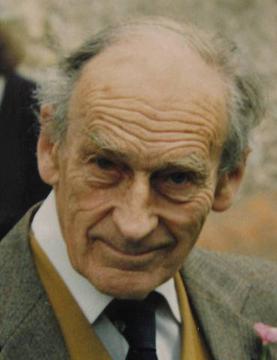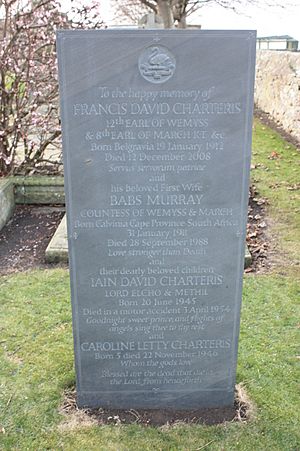David Charteris, 12th Earl of Wemyss facts for kids
Quick facts for kids
The Earl of Wemyss and March
KT DL
|
|
|---|---|
 |
|
| Lord Clerk Register | |
| In office 28 July 1974 – 27 April 2007 |
|
| Monarch | Elizabeth II |
| Preceded by | The 8th Duke of Buccleuch |
| Succeeded by | Lord Mackay |
| Member of the House of Lords Lord Temporal |
|
| In office 12 July 1937 – 11 November 1999 Hereditary Peerage |
|
| Personal details | |
| Born |
Francis David Charteris
19 January 1912 Stanway, England |
| Died | 12 December 2008 (aged 96) Edinburgh, Scotland |
| Parents |
|
| Residence | Gosford House |
| Education | Eton College |
| Alma mater | Balliol College, Oxford |
| Military service | |
| Allegiance | |
| Branch/service | |
| Years of service | 1932–1944 |
| Rank | Major |
| Unit | Lovat Scouts, Royal Pioneer Corps |
| Battles/wars | World War II |
Francis David Charteris, also known as the 12th Earl of Wemyss and 8th Earl of March (born January 19, 1912 – died December 12, 2008), was an important Scottish noble. He owned a lot of land and worked to protect nature and history. From 1946 to 1991, he was a leader for the National Trust for Scotland, an organization that looks after special places.
Contents
Early Life and Education
Francis David Charteris was born in London, England. His mother was Lady Violet Manners, and his father was Captain Hugo Francis Charteris, Lord Elcho. Sadly, his father died in 1916 during the First World War.
Francis went to two famous schools: Eton College and Balliol College, Oxford. He also studied farming at Oxford and Cambridge universities. When he was 25, in 1937, he became the Earl of Wemyss and March after his grandfather passed away.
His Career and Public Service
Francis David Charteris had a long and varied career, serving his country and community in many ways.
Military Service
In 1932, he joined the Lovat Scouts, a part of the British Army. He became a Lieutenant in 1935. During World War II, he served as a Major with troops from Basutoland (now Lesotho) in North Africa. He was good at speaking the Sotho language, which helped him in his role.
Important Roles in Scotland
He held several important positions in Scotland:
- He was a Deputy Lieutenant from 1959 to 1967. This is a local role helping the Lord Lieutenant.
- He was the Lord Lieutenant of East Lothian from 1967 to 1987. This meant he was the King or Queen's personal representative in that area.
- He was a Justice of the Peace from 1957, helping with local law and order.
- He was appointed Lord High Commissioner to the General Assembly of the Church of Scotland three times (1959, 1960, and 1977). This is a special role representing the monarch to the Church of Scotland.
- From 1974 to 2007, he held the honorary title of Lord Clerk Register. This is one of the oldest offices in Scotland.
Protecting Scotland's Heritage
Francis David Charteris was very dedicated to preserving Scotland's history and nature.
- He was the Chairman of the National Trust for Scotland from 1947 to 1967, and then its President from 1967 to 1991. This organization works to protect and share Scotland's natural and cultural heritage.
- He also led the Royal Commission on the Ancient and Historical Monuments of Scotland for many years (1949-1984). This group records and protects historical sites.
- He was President of the Royal Scottish Geographical Society (1958-1962) and the National Bible Society of Scotland (1960-1983).
Personal Life
In 1940, Francis David Charteris married Mavis Lynette Gordon Murray. They had two daughters and two sons. Sadly, their elder son, Iain David Charteris, died in a car accident in 1954. Their younger daughter, Caroline Letty Charteris, passed away shortly after she was born in 1946. Mavis died in 1988.
In 1995, Lord Wemyss married Shelagh Kathleen Kennedy. He lived at Gosford House in Scotland. He passed away on December 12, 2008, at the age of 96. He is buried in Aberlady Churchyard.
His younger brother, Martin Charteris, was a very important person who worked as the Private Secretary to Queen Elizabeth II.
His younger son, James Donald Charteris, became the 13th Earl of Wemyss after his father's death.
Honours and Awards
For his many contributions, Francis David Charteris received several honours:
- In 1966, he was made a Knight of the Thistle. This is a very high honour in Scotland, given by the monarch.
- He received honorary degrees from the University of St Andrews in 1953 and the University of Edinburgh in 1983. These degrees recognized his achievements and service.
 | Precious Adams |
 | Lauren Anderson |
 | Janet Collins |


